#with specializations in fields such as Computer Engineering
Explore tagged Tumblr posts
Text
Shah & Anchor Kutchhi Engineering College (SAKEC), Mumbai
Detailed Review of Shah & Anchor Kutchhi Engineering College (SAKEC), Mumbai OverviewShah & Anchor Kutchhi Engineering College (SAKEC), established in 1985, is a renowned engineering institute located in Mumbai, Maharashtra. The college is affiliated with the University of Mumbai and approved by AICTE. SAKEC offers various undergraduate and postgraduate programs in engineering and technology.…
#and AI and Data Science. The college is NAAC and NBA accredited and is AICTE approved#Electronics and Telecommunication Engineering#highlighting its commitment to high standards of education#including BTech and MTech degrees#Information Technology#SAKEC offers a range of undergraduate and postgraduate programs#Shah & Anchor Kutchhi Engineering College (SAKEC) is a prominent name among engineering colleges in Mumbai. As an autonomous institution#with specializations in fields such as Computer Engineering
0 notes
Text
Preview: On the Horizon
Summary: You've been pining over your coworker for a while now. He might not have realized but someone has.
Paring: Tyler Owens x F!Reader (with minor Scott x F!Reader)
Rating: Mature, 18+ only. Angst, smut, flirting and asshole!Scott A/N: Thanks to @writercole for the summary. Hoping to have this fic out next weekend!
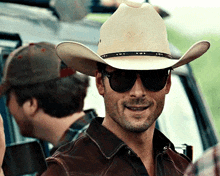
You brush the sweat from your brow as you surreptitiously watch Scott work beside you. He doesn't seem bothered by the heat, typing away on his computer despite the stagnant air. It makes you long for the cool labs you used to work in before Javi recruited you. Although he'd likely tell you this weather was perfect for a storm, you're miserable. Meteorology wasn't even your field; you were here for your engineering expertise to handle the specialized equipment the team needed to gather their data.
From your vantage point on the tailgate of the truck, you observe the other storm chasers gather around Tyler Owens' red truck. The man in question emerges with a brilliant smile, and beside you, Scott scoffs, annoyed. He hates Tyler, and you're pretty sure the feeling is mutual from the brief interactions you've observed.
"Ass," Scott mutters, returning his attention to his computer.
When you look up again Tyler's gaze falls on you. He grins and winks, pulling down the brim of his hat in acknowledgment. Before you can react, he's turned to speak to one of the young women on his team, giving her his full attention. A hand rests casually on her shoulder.
You wish Scott would acknowledge you like that. You thought things would be different after the night you shared weeks ago, but he'd been quick to dash those hopes the next morning, ignoring you completely. He only seemed to look at you when he needed your tech skills or when you made a mistake. Your cheeks still burn from his last reprimand in front of the team.
Clearing your throat, his eyes briefly land on you before returning to the screen in front of him. "What?" he demands.
"Oh. I was going to get something to eat. Do you want something?”
"Yeah, you know what I like," he says dismissively. When it's clear that's all you're getting from him, you push off the truck onto the dusty road with a soft exhale and head into the gas station.
The air conditioning inside practically makes you groan with relief, and you take a moment to appreciate the cool air.
"You're not melting on us, are you, city girl?" You jump at the unexpected voice, surprised to see it belongs to Tyler. "MIT got you all wound up, huh?” He questions, amused.
"What?"
"Your boss," he clarifies.
"Oh, he's um... he's not my boss. Javi is."
"No?" he questions, brows raised. "Well, he certainly barks at you like he is."
Heat rushes to your face as you realize Tyler must have overheard Scott reprimand you yesterday after you miscalibrated one of the sensors.
"If you worked with my team, I'd be a lot nicer," he says.
You stare at him, unsure how to respond to his comment or the flirty tone. Before today you’d hardly spoken, he mostly interacted with Javi or Scott. You’re saved from answering when the bell on the door jingles and someone calls your name.
It’s Scott.
"Owens," he bites out, surprising you when he rests a hand on your shoulder and stands close enough that you feel his shirt brush your arm. Your lips part and your lashes flutter in response.
Tyler's gaze drops briefly to your mouth before returning to your face with a knowing smile. "Well, I enjoyed our chat," he tells you, not bothering to acknowledge Scott. "We should do this again, sweetheart."
"What did he want?" Scott demands, move to stand in front of you after Tyler’s gone.
"Oh, nothing. Just... saying hi."
Scott's jaw tenses, and he steps into your space, cupping your elbow. "You shouldn't talk to him," he advises.
When he tilts his head to stare down at you, something flickers in his dark brown eyes that looks an awful lot like jealousy. You glance over your shoulder at Tyler, only to have Scott say your name again, more forcefully. When you turn back around your suspicions are confirmed. For the first time since that night in the hotel room, you have Scott’s full attention and that sends a thrill of excitement through you.
You bite your lip, the beginning of an idea coming together.
Part 1 is now out!
1K notes
·
View notes
Text
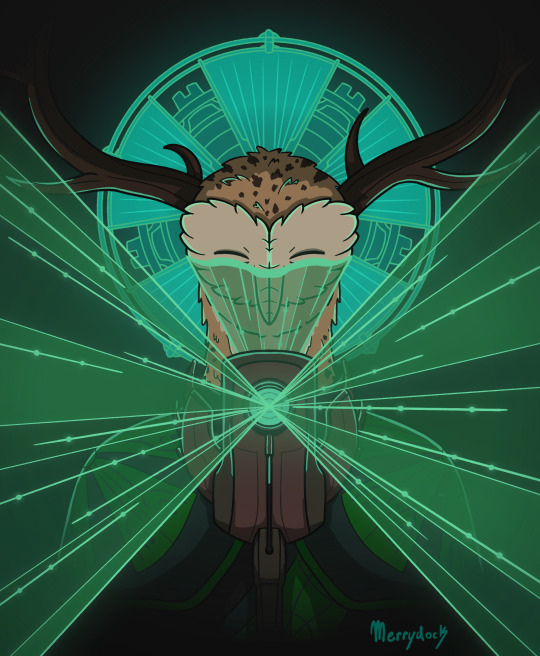
Some old art of my Owlk engineer, Eris, designing the Stranger's solar sails! Enjoy a big ramble about him and his job because I love this silly man:
Eris works on the design team for the Owlk space program, specialising in energy and propulsion technologies for the ships, satellites, and probes. Having a design philosophy of functionality and beauty, Eris enjoys going all-out with his work. He has received special recognition for his solar panel designs in particular, which borrowed from the unparalleled efficiency found in photosynthesizing plants.
When designing the Stranger's solar sails, Eris took inspiration from plants, but also the opening of insect elytra; the ballooning behaviours of silk-producing invertebrates, in which they sail from tree to tree using electric fields and air currents; and how flying creatures will use thermal updrafts to soar higher while expending less energy. Already familiar with how solar energy impacts technology from his work on solar panels, he proposed the use of this energy to propel the Stranger through space.
As travelling the distance between stars presented the major roadblock in the plan to reach the Eye (regarded as the Interstellar Propulsion Problem), Eris was lauded for his contributions, promoted to being one of the main engineers overseeing the Stranger's design.
More information about his general design process below!
When designing for a project, Eris uses all of the tools at his disposal. His first weapon of choice is always his pencil, and he will sketch out potential sources of inspiration on paper until the design concept begins to take form. Based on the initial project parameters he's been given, he drafts up a blueprint for his components.
Next, he must further conceptualise his designs. This is where the most valuable tool of the trade comes into play—the Vision Torch! Vision Torches serve many purposes for Owlks, from allowing them to nonverbally communicate to creating photographs from memory alone. Owlk engineers LOVE Vision Torches for how easy they make effectively communicating ideas. They allow concepts to be visualised in 3D, basic functionality to be shown through animations, and are even able to interface with computers. Eris might even 3D print a model using a Vision Torch to help him visualise his concepts as he works.
The space program is extremely collaborative, and Eris works on just a small part of the overall project, so being able to easily share ideas with others and see how all the individual components of a satellite or ship interact is vital. When discussing with more than a single other Owlk, Eris can use a Vision Torch linked to a holographic display to present concepts to a crowd. Concepts can also be tweaked in real time this way!

[Here's an example from the game of Owlks building the simulation with Vision Torches and a holographic display!]
With a Vision Torch, concepts can also be directly uploaded to a computer terminal. This is where a lot of the real work gets done - calculating weight, materials needed, stress testing in simulations, calculating trajectories, making precise tweaks to finalize the design, you name it. This also allows other Owlks working closely with Eris to access the most current design for their own tests.
This is an iterative process - as other Owlks finalize their components, as weight limitations are further restrained and material needs are calculated, Eris often has to go back to an earlier step and rework his concept. Fortunately, he thoroughly enjoys getting to be creative in his work (and doing math) and treats every project as a puzzle that needs to be solved! The only time when he's not excited to go back to the drawing board is when a last-minute adjustment from his peers means he needs to work long hours to get his work done in time for launch.
#outer wilds#outer wilds spoilers#echoes of the eye#echoes of the eye spoilers#outer wilds oc#my art#eris#my workaholic son#someone needs to tell him to take a break#please
68 notes
·
View notes
Text
A prominent computer scientist who has spent 20 years publishing academic papers on cryptography, privacy, and cybersecurity has gone incommunicado, had his professor profile, email account, and phone number removed by his employer, Indiana University, and had his homes raided by the FBI. No one knows why.
Xiaofeng Wang has a long list of prestigious titles. He was the associate dean for research at Indiana University's Luddy School of Informatics, Computing and Engineering, a fellow at the Institute of Electrical and Electronics Engineers and the American Association for the Advancement of Science, and a tenured professor at Indiana University at Bloomington. According to his employer, he has served as principal investigator on research projects totaling nearly $23 million over his 21 years there.
He has also coauthored scores of academic papers on a diverse range of research fields, including cryptography, systems security, and data privacy, including the protection of human genomic data. I have personally spoken to him on three occasions for articles here, here, and here.
“None of This Is in Any Way Normal”
In recent weeks, Wang's email account, phone number, and profile page at the Luddy School were quietly erased by his employer. Over the same time, Indiana University also removed a profile for his wife, Nianli Ma, who was listed as a lead systems analyst and programmer at the university's Library Technologies division.
As reported by The Bloomingtonian and later the The Herald-Times in Bloomington, a small fleet of unmarked cars driven by government agents descended on the Bloomington home of Wang and Ma on Friday. They spent most of the day going in and out of the house and occasionally transferred boxes from their vehicles. TV station WTHR, meanwhile, reported that a second home owned by Wang and Ma, located in Carmel, Indiana, was also searched. The station said that both a resident and an attorney for the resident were on scene during at least part of the search.
Attempts to locate Wang and Ma have so far been unsuccessful. An Indiana University spokesman didn't answer emailed questions asking if the couple was still employed by the university and why their profile pages, email addresses, and phone numbers had been removed. The spokesman provided the contact information for a spokeswoman at the FBI's field office in Indianapolis. In an email, the spokeswoman wrote: “The FBI conducted court authorized law enforcement activity at homes in Bloomington and Carmel Friday. We have no further comment at this time.”
Searches of federal court dockets turned up no documents related to Wang, Ma, or any searches of their residences. The FBI spokeswoman didn't answer questions seeking which US district court issued the warrant and when, and whether either Wang or Ma is being detained by authorities. Justice Department representatives didn't return an email seeking the same information. An email sent to a personal email address belonging to Wang went unanswered at the time this post went live. Their resident status (e.g., US citizens or green card holders) is currently unknown.
Fellow researchers took to social media over the weekend to register their concern over the series of events.
“None of this is in any way normal,” Matthew Green, a professor specializing in cryptography at Johns Hopkins University, wrote on Mastodon. He continued: “Has anyone been in contact? I hear he’s been missing for two weeks and his students can’t reach him. How does this not get noticed for two weeks???”
In the same thread, Matt Blaze, a McDevitt professor of computer science and law at Georgetown University, said, “It's hard to imagine what reason there could be for the university to scrub its website as if he never worked there. And while there's a process for removing tenured faculty, it takes more than an afternoon to do it.”
Local news outlets reported the agents spent several hours moving boxes in an out of the residences. WTHR provided the following details about the raid on the Carmel home:
Neighbors say the agents announced "FBI, come out!" over a megaphone.
A woman came out of the house holding a phone. A video from a neighbor shows an agent taking that phone from her. She was then questioned in the driveway before agents began searching the home, collecting evidence and taking photos.
A car was pulled out of the garage slightly to allow investigators to access the attic.
The woman left the house before 13News arrived. She returned just after noon accompanied by a lawyer. The group of 10 or so investigators left a few minutes later.
The FBI would not say what they were looking for or who is under investigation. A bureau spokesperson issued a statement: “I can confirm we conducted court-authorized activity at the address in Carmel today. We have no further comment at this time.”
Investigators were at the house for about four hours before leaving with several boxes of evidence. 13News rang the doorbell when the agents were gone. A lawyer representing the family who answered the door told us they're not sure yet what the investigation is about.
This post will be updated if new details become available. Anyone with firsthand knowledge of events involving Wang, Ma, or the investigation into either is encouraged to contact me, preferably over Signal at DanArs.82. The email address is: [email protected].
34 notes
·
View notes
Note
goh parentified child syndrome. go(h)
my time is here at last. thank you for enabling me <3 apologies for taking months to finish writing this giant post!
welcome to my dissertation on this fucking Dynamic <3

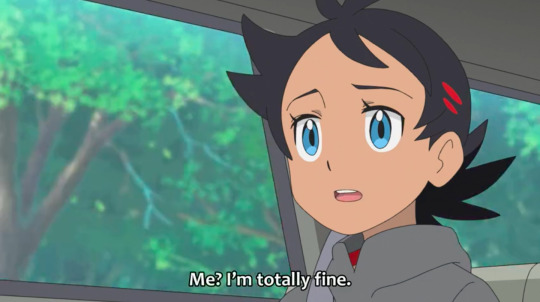
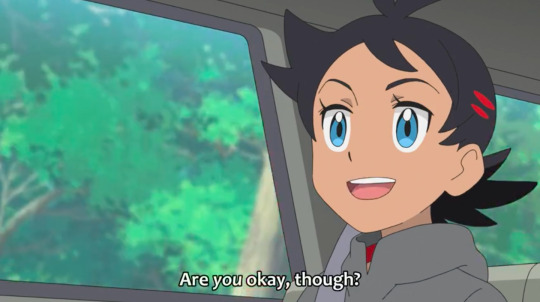
ok! first thing, let's establish our criteria for Parentified Child Syndrome. this is obviously not like, an actual diagnostic Thing, but there are a million and one articles out there for us to look through. so i did the tough work of scouring those to find some Symptoms we can use as anchor points here. a lot of this is split into "emotional" (parents seeking comfort from their children, rather than comforting them) vs. "material" (parents assigning their children responsibilities that are not age-appropriate (e.g. grocery shopping, paying bills, etc.)) needs, but for simplicity i'll just merge them together - because realistically, they often go hand-in-hand. so the primary symptoms we'll work with here will be:
disruptive childhood behaviours (particularly at school)
stress and anxiety
reluctance to participate in play/age-appropriate activities with their peers
difficulty acknowledging and accepting one's feelings
insecure attachment styles
need to feel "in control"
distrustful of others/self-reliant to a fault
absenteeism and poor performance in school
passive communication style
the other obvious prerequesite here is the family dynamic. so let's dissect that one a bit!
goh's family situation isn't actually like...100% clear. but i have analyzed every episode where his family is even mentioned like it's my full-time job and i have no reason to believe his grandmother actually lives with him. so in the scope of this essay, i am assuming that she lives nearby, and most likely has a key to the apartment, but does not live with them.
otherwise, we are given enough context to assume that camille and walker have been busy with work goh's entire life (though i'd choose to believe for my own sanity that in his infancy his mother at least wasn't working...though given the type of job she has, that's actually...kinda hard to say for sure). we can also assume that they've at least been self-employed for the majority of his life. it's clear that they are fairly well-established in the city/in their field by jn, and since goh is supposed to be 10 at this point, it makes sense to me that they've been building that company up pretty much his whole life.
in terms of the work they do, goh tells ash, my dad is a system engineer and my mom is a programmer. they run a company together. granted, we don't see very much of their actual workplace, but what we do see is completely void of other people. as in, camille and walker do all this work BY THEMSELVES.
nothing in the anime otherwise disputes this! if anything, goh's explanations of his parents' lifestyle just reinforces it. he also suggests that during periods of harsh weather and heavy system use, his parents are busier than usual. this implies that they are most busy during holidays. this is actually further implied by the flashback in jn015 where they explicitly say to him that they're sorry for having to work through the holiday. his reaction, being completely unengaged, not even really even acknowledging it, tells us that this is the norm.
however!! he also shows off a special device to horace in jn032 that he says his parents made specifically for him, to help him learn more about mew. this suggests that they must have some amount of free time to dedicate to him...but they show their love for him through material gifts related to their line of work (his computer set-up, too; he tells scorbunny that his parents set it all up for him).
otherwise, we see camille and walker privately share their concerns about goh (a clear awareness that he doesn't have many friends, concern about him being lonely because of them, etc.) but never actually confront goh with their concerns or appear to go out of their ways to do anything about it. i wrote a bit about this and the symbolism of having him catch a cubone of all pokemon in the episode we're introduced to his family here but the tl;dr is that camille and walker demonstrate care for goh to each other but not to him - presumably to compensate for their physical absence, we get the impression he's given a lot of freedom and little to no discipline.
which brings me to the first criterion:
disruptive childhood behaviours (with a side of absenteeism, which presumably contributes to poor performance in school)
goh's school life is obviously inconvienent to the plot progression, so for narrative purposes the writers have him just not go to school. in jn049 we get the explanation that goh had made a promise to their teacher to show up to school for tests...but the weird thing about this scene is that chloe's surprised by it:
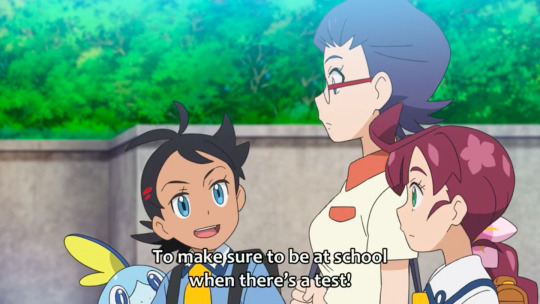

since in jn001 and jn002 we see that chloe is goh's only point of contact amongst his schoolmates and that she hand delivers schoolwork to him at her dad's lab, the only way this exchange really makes sense to me is if it's a new arrangement. even the fact that goh makes a point of saying "hey, i followed through, go me" to their teacher here gives that vibe.
so, we can extrapolate from that that...prior to whenever this agreement was made, goh just didn't go to school because he didn't want to. but given how schools operate, we can pretty safely assume his parents are aware of this. and i have strong reason to believe that they have at least been on the receiving end of phone calls from teachers or administrators, because of these lines from jn015:
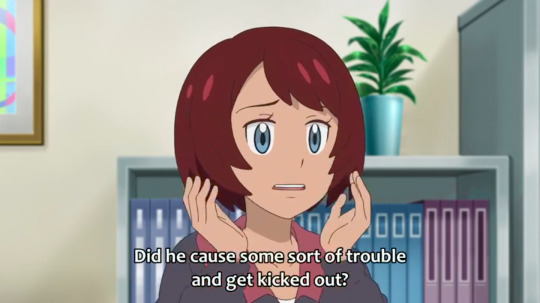

all things considered, this is a weird assumption to make, especially about your hyper-independent introverted child...unless there's a history of disruptive or unfriendly behaviour to inform that assumption. and based on goh's behaviour in jn001 at professor oak's pokemon camp, i don't think it's so out there to say the pattern probably was there.
goh is actually a super sweet kid towards his parents and has a clear admiration for them both. even in flashbacks, his whole thing is kind of like...he doesn't want to bother them. they fall asleep on family vacation and don't spend time with him? well, that's fine! he'll just find something else to do! in that same episode in the flashback sequence, they pick him up on the side of the road alone in the pouring rain and he doesn't say a word to them. even though he was angry and upset before.
so, yeah. i think it would make a lot of sense if he were well-behaved at home and not so much so at school. but camille and walker, even when they learn about things that happen, don't seem to probe or discipline him. whether because of any combination of giving him leeway out of guilt or of not wanting to encourage him to act out at home, we don't know. but the disconnect obviously exists.
which then contributes to
stress and anxiety, difficulty acknowleding and accepting one's feelings, and passive communication style
goh is socially awkward, yes, and clearly very anxious socially especially early on in jn, but a lot of that seems to come from an inability to express his wants and needs. i think jn003 has some of the most succinct examples of this - ash having to realize he's struggling and to reach down to him when they're climbing the tower in order for him to even accept that he can get (and needs) help getting up, and then later one when he stumbles over his words trying to ask ash to be his friend.
i think another good example is in jn007, after he gets knocked out at the flute cup. passive communication relies a lot on shifts in body language and in, well, passive statements. when ash approaches him to tell him to cheer up, goh doesn't actually really...respond to that. he does this


and then runs off. which he does fairly often, actually, even as late as jn135. it's emotional avoidance 101. literally just run away from the thing that's bothering you. something else we see in jn135 is him backing out of admitting he wants to go on a journey - because he is concerned about ash's reaction (though i think it's a little more complex than that, but i'll circle back to that).
and of course there's jn062, which i wrote a lot about in this post. but the whole thesis of the episode is that goh has learned through his relationships up to this point that it's okay to not understand your feelings but you still have to feel them. and it's actually a really beautiful character development moment for him, but also reinforces the fact that he still doesn't know how to grapple with his own emotions. after finally finding drizzile and explaining how he knew he would find it there, he starts to cry and doesn't know why. but even aside from feeling vulnerable, it's kind of a culmination of this stress he's been carrying with him throughout the whole episode...and the sense of responsibility he feels for driving drizzile away. which is a great segue into
insecure attachment styles and need to feel "in control"
if there's one thing i feel like people sleep on regarding goh's character, it's how much of a mother hen he is. he's obviously very thorough and thoughtful when it comes to looking after his pokemon - as in jn062 where he spends all that time chasing down drizzile after it runs away, even to the point of telling ash and chloe that they should stay behind because it's getting late but that he's going to keep looking - but he's the same way with ash.
off the top of my head, things like buying extra scones because he knew ash would want them, making ash wash his hands after eating ice cream, chastising him about punctuality, you know...very parental kind of things. he actually does it with horace too, when they first meet, by bringing a lunch for them both when he goes back to the forest to meet him again.
anyway, being a Mom Friend is cute and all, but it also REEKS of parentified child. taking on responsibilities that aren't yours to fulfill? yeah. that's a need to feel in control. it's what he's used to! it offers him security!
the other side of this is...chloe. goh's first friend, who he refuses to consider a friend, or let consider him a friend. but, like, she obviously IS his friend. and yet our introduction to them gives us this exchange
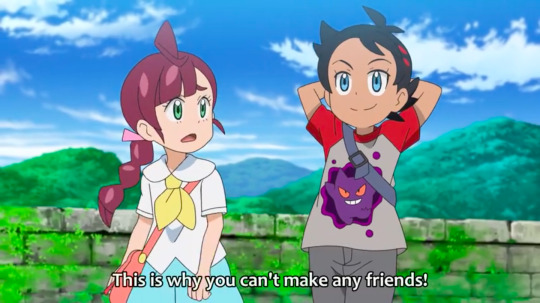
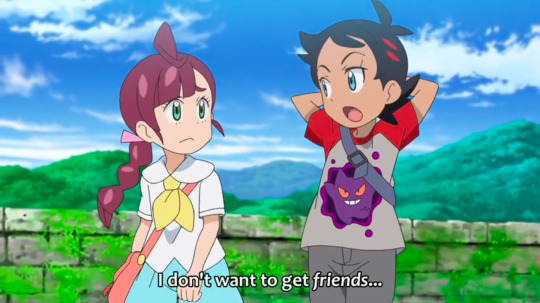
goh and chloe have a pretty tense relationship at the beginning of jn, wherein she is clearly trying to help him (by you know. getting his homework for him and shit) and he blows her off in a text message, which she complains is a repeating behaviour. chloe is obviously very loyal to him, even though he doesn't seem to repay the favour. again, there's a big disconnect here.
insecure attachments generally stem from anxiety over potential rejection and/or poor self-esteem cultivated in childhood based on parents’ emotional availability (or lack thereof) to their children. by keeping chloe an arm's distance away, goh keeps himself safe from the dangers of vulnerability, taught to him through childhood encounters with emotionally unavailable parents.
i'm not here to armchair diagnose (ok, who am i kidding, yeah i am), but i think goh's attachment style is anxious-avoidant. his clear avoidance of making friends, the multiple times we see him break off his friendship with ash only to minutes later be like "me and the bestie"...yeah, that's avoidance. but he does crave intimacy, arguably even more than he fears it.
hence why even though he knows ash would want him to journey on his own...he still convinces himself that actually telling ash that would be, as he calls it, a "betrayal of [their] friendship." my theory is that he's not concerned that ash will be upset - he's concerned that ash won't be upset enough. which is why when then ash turns it around on him and says he's going on a journey, goh gets upset and pushes him away. he does the exact same thing with horace when they're younger. just a complete 180 - he wronged me once, so he's the worst and i can't forgive him, ever.
the difference with chloe is that she actually takes care of him more than he takes care of her - which changes the dynamic from "i have to do everything to keep this person in my life, including suppressing my emotions for their sake" to "i cannot express to this person that i have needs and desires because they'll think i'm too much and they won't stick around if i do." which is primarily avoidant, but insecure attachment nonetheless.
this is extrapolation, but i think his relationship with chloe is so different because we are supposed to get the sense that they have a more familial dynamic. so, she's the one person he can't push away from him - but as he learned in his actual family dynamic, he also can't be too close to her. he doesn't want to be smothered; he doesn't want her to feel smothered by him. so they maintain a degree of separation that only begins to go away after her father begins literally housing and feeding him, thus integrating him and ash into their family in some honorary way.
which brings me to the last point, i guess, which is
reluctance to participate in age-appropriate activities with peers and self-reliant to a fault
these are, i think, the traits that jn is most blatantly attempting to better in goh throughout his arc. so i won't spend too long hashing it out, because i think these are things we all know he struggled with!
in flashbacks, we see him alone at school; during the first episode, at professor oak's camp, he is always physically distanced from the other kids and chloe even points out that he's basically doing professor oak's job at one point! he's not on the same level as the other kids and it's clear he doesn't want to be. when he meets horace, we see that it takes him some time to get comfortable enough with him to go explore the forest together and become friends.
he doesn't go to school, but that doesn't mean he isn't learning things - he becomes a very self-directed learner early on, from what he see. he's not just like...rotting in his room playing video games. he's studying and researching. the only times aside from with horace that we see him in a flashback doing something that isn't solitary is with pokemon - and even then, he's like...reciting their pokedex entries. his abra story at the end of jn is precipitated by him saying he was going through his dad's old pokedex (which is a whole other thing - this implies walker used to be a trainer, but neither of goh's parents seem to have pokemon...perhaps they're too busy with work to look after them? a theory for another time, i suppose, but it has undeniably being gnawing at my brain since that episode aired lol).
and of course, there's the fact that in jn062 he tells drizzile he was never comfortable with confiding in his parents or his grandmother...suggesting that he never confided in anyone, because we don't really get the sense from the whole "i don't NEED friends" exchange in jn001 that he considers chloe a reliable confidant, either.
the other place we see his flawed sense of self-reliance, aside from like...everywhere in the first 10 or so episodes, lol (something that is reflected pretty beautifully and symbolically in scorbunny's story, too!), is in project mew. he has to learn how to work in a team - and he clearly hates it. at this point he's found one person to rely on, but that already feels like too much. the raid battle with articuno is the most obvious example of this. he isn't good at being a leader, but he also isn't good at being a follower. because he's only ever been responsible for himself, and he doesn't trust anyone else to know how to direct him, but he also has no clue how to work within the parameters of a team.
i also want to say, as a final note, that i actually think this is all extremely intentional writing. obviously in the west we have a strong capitalism culture too, but the work culture in japan is very toxic (just google "japan work culture" and you can see right away how intense it is lol) and i'm not actually surprised at all that pokemon would make such a direct commentary on that - a lot of japanese kids could probably relate to goh and his emotionally absent, work-obsessed parents! they are clearly pretty well-off, but their dedication to work supercedes matters of home and family, because that's how it's supposed to be. as a result, goh admires them a lot for this dedication - but his arc is primarily about letting go of the "work" part of interacting with pokemon and learning how to have fun and make the most of his experiences. and i think that's a really lovely message for modern pokemon to be sending to kids :')
#answered#*meta#mine#i wrote most of this in may but i came back to finish it tonight shjdfghj hi#goh#pokemon#anipoke#tangentially i actually noticed something similar with the way hz has the kids do like...distance learning and stuff LOL#even sv in itself as like. a school-based adventure. the current culture influence is SO glaring...of course they're emphasizing school as#part of this fantasy world for kids to escape in. i think a lot of adults didn't Get It...but sv were developed during covid. so...yeah#pokemon has always done a very good job of making cultural commentary like this imo!
104 notes
·
View notes
Text
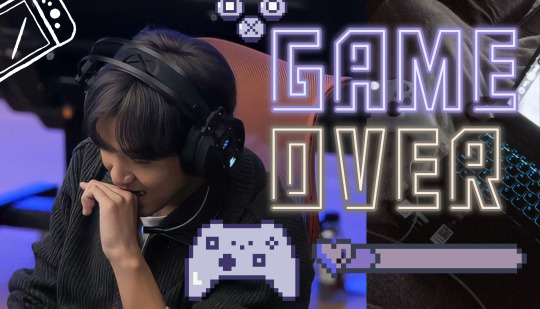

Game Over - Haechan SMAU Player 01
Synopsis; When members of NCU's ESport's team start dropping out of this years tournament due to schedule conflictions, Haechan is put in a tough situation. Does he bite back the hostility of letting a girl that he doesn't even know join the team so they have a fighting chance at this years championship, or does he let the frustration and stress of being Captain weight him down and hurt the team in the long run.
Y/N, NCU's own dedicated journalist has been tasked with covering this semester's ESport's Tournament. What happens when members of the team are unable to play and ESportsCaptain!Haechan has to recruit a certain journalist to compete. What better way to write a ground breaking column about ESports than to experience it first hand? Luckily for her, Haechan is desperate enough to teach her the ends and outs of competitive gaming.
Genre; Gamer!Hc, Journalist!Y/N, Strangers to Lovers, Some Rivlary, A little angst here and there, some fluff, a little bit of everything :)
masterlist, next

Y/N's Friends; Hot Bitches & Switches


Y/N; NCU's residential (anti-social) journalist! 3rd Year Journalism Major. Contrary to majoring in a field that requires making connections and socializing, y/n is NOT the strongest conversationalist. However, all her closest friends made in collage has been through interviews for her columns. Her gloomy, brooding exterior works in her favor by scaring off potential interactions. Her close friends know she's all butterflies and rainbows, however they do question every day why she went with journalism instead of something that has less to do with the general population.
Y/N (private); Nonchalant by day, the most chalant person you'll ever know by night. Her private twitter is her journal where she lets loose her excitement, fears, and worries.


Renjun; NCU Art Major and strong member of the debate team. Never get into a disagreement with this guy, he'll having you pulling your hair out and screaming into the abyss by the end of it. Met Y/N during their 1st year of Uni. She took on the column for the Debate Team and clicked with him under their mutual disdain for social interactions.
Jisung; NCU Computer Engineering Major. Y/N's sexy brained friend. She zone's out when he talk about his ESport's Matches but locks in when he talks about the inner makings of a Alienware Aurora R16 or whatever the hell that is. Big gentle giant that Y/N can't help but baby. She met him through a Minecraft sever they both played on in middle school. Her ride or die when it comes their shared Minecraft World.


Winter; NCU Fashion Major. She works with all the preforming arts kids and helps them put together their showcases. She will NEVER let you leave the house looking like a hot mess if she has anything to say about it. She's also captain of basketball cheer squad. That's how she and Y/N met. A little boy crazy but what college cheerleader isn't. 1/2 of Y/N's roommates.
Karina; NCU's self proclaimed health nut. She's a Food and Nutrition Major specializing in Sports Dietitian. Member of the basketball cheer squad and 2/2 of Y/N's roommates. The groups mom. Always making sure they're eating well and staying healthy.

Chenle; NCU Business Major but that doesn't stop him from diving into his passion for basketball. No one can beat his crazy accuracy, and that's why he's their shooting guard. Him and Y/N grew up together, practically raised as siblings. Her #1 hater (with love). A member of NCU's ESport's team. He may or may not be the reason for her social anxiety. When you grow up with someone whose natural charisma is strong and attention grabbing, you can't help but to feel the eyes of everyone around you staring holes through you. Though she love's Chenle to death, unless she plans their solo outings, she only hangs out with him in a group setting.

notes: and that's a wrap on the first set of characters and profiles!! if you're enjoying it so far and want to be added to a tag list lmkk!!
#nct smau#haechan#lee haechan#nct haechan#lee donghyuck#nct donghyuck#nct dream donghyuck#nct dream haechan#haechan smau#haechan social media au#haechan fake texts#haechan x reader#haechan fluff#donghyuck x reader#nct dream#nct#nct fluff#nct 127#nct 127 haechan#nct fake texts#nct social media au#nct 127 fake texts#nct dream fake texts#nct dream smau#nct dream x reader#nct 127 smau
23 notes
·
View notes
Text
A train simulation at the heart of Japan's videogame production genesis
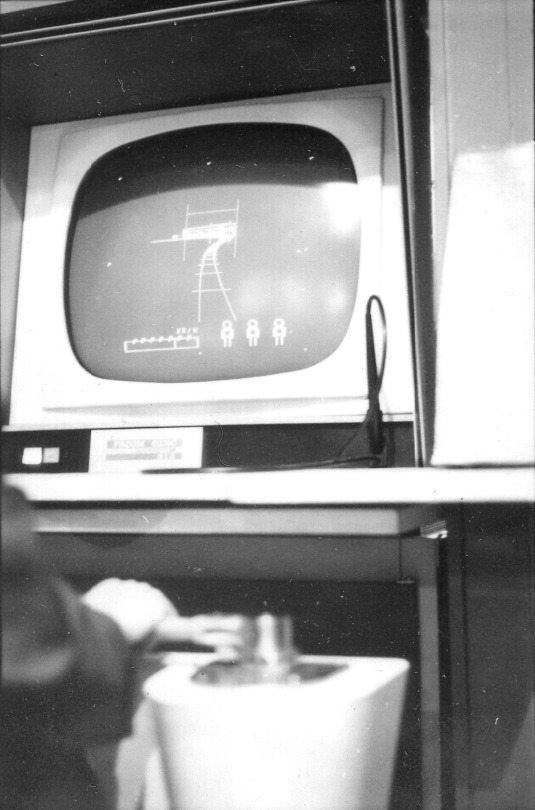
As the great videogame historian Florent Gorges explains in a recent video, one of the most beguiling developments in Japanese videogame history research comes to us from an unlikely source. Twitter user and train aficionado @yota8nsx reminisces about an episode of his childhood, namely his visit to Expo '70 in Osaka, describing a particularly captivating train simulation game playable at the Furukawa Pavilion and whose implications, if properly understood, make this one of the most important findings in this field of research.
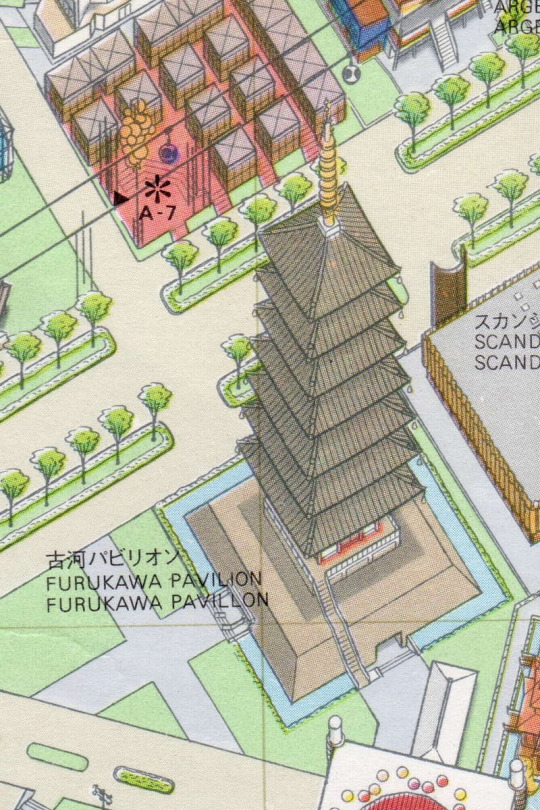
A flyer illustration of the seven story pagoda building created specifically for the occasion, a traditional architectural reference that contrasted with the latest high-tech creations hosted within it.
Late last year, @yota8nsx uncovered pictures of the exhibit captured from a speciality magazine that show this early simulation game appearing to use vector graphics to depict a train track, as well as some custom-made mechanic train cab control levers. He captions the pictures with his memories of how the program functioned:
Well, there was a limit to what could be done given the capabilities of computers in the 1970s. This is an article on page 61 of the July 1970 issue of Railway Pictorial magazine and an image taken by an acquaintance of mine. (...)
It was over 54 years ago, so my memory is a bit hazy, but I think when I accelerated, I would fall backwards, and when I braked, I would fall forwards. There are about three different angles of reclining, and each was scored based on how comfortable the ride was. If I had gotten 90 points out of 100, I would have received a medal. In the picture, it's 76 points.
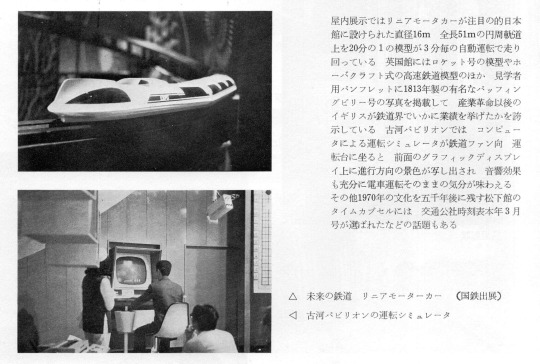
After performing some complementary research I was able to find that the program ran on an IDI Input-Output Machine, a computer developed in the mid 60s by New York-based company Information Displays, Inc. The IDIIOM is widely regarded as the first commercial CADD platform with powerful vector graphics capabilities and a light pen interface. Another game known to have been developed using the same machine is the Daly CP (Chess Program), one of the earliest GUI-based chess games, authored in 1969 by NASA researcher electrical engineer Chris Daly.


However, there are reasons to believe that this was either an adapted Japanese version of the system; or that it was in some manner connected to another terminal, as evidenced by code shown below the screen which appears to read Facom, followed by an alphanumeric code. As you may know, this was the name for Fujitsu's earliest computer line. Could this subtle hint refer to a separate terminal in which the actual game code was created or, perhaps even, running?
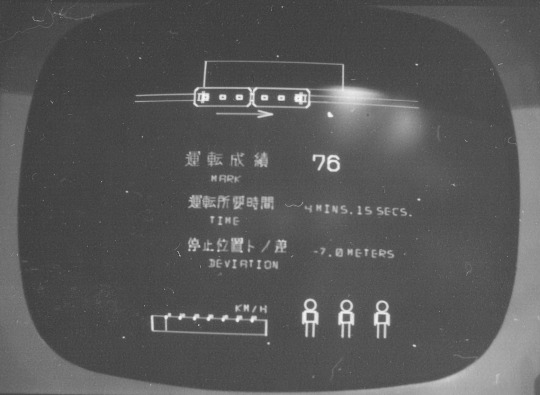
Despite the scarce information, namely the complete absence of any details concerning the authors of this magnificent experiment, there is sufficient documentation to establish this as one of the earliest known games ever to be created in Japan. Certainly, its existence is far better established than many of the often cited, Japanese university computer lab game creations from students of the 1960s.
The importance of this finding cannot be overstated, especially if one is to consider that the images hint at the distinct possibility that the game used vector graphics to represent a moving 3D train track. This some three years before Maze War, hitherto the first known game to have used three-dimensional visuals.
Disappointingly, the program itself is certain to have vanished altogether and there are hardly any leads that can explored to shed further light on this singular creation. I, for one, feel indebted to this old Japanese railfan for his invaluable contribution to what other information existed on this subject.
- Update (26/03)
The venerable Matt Sephton has pointed the way for additional information concerning this game as well as the Osaka Expo of 1970.
Some of these resources, including Classic Videogame Station, refer to this game as 電車の運転テス, or Densha no Unten Tesuto - literally Train Driving Test. Some additional photos are also provided, namely this rare colour capture showing a woman dressed as a train assistant, helping a young player. Unfortunately, this image doesn't offer additional visual access to the control levers, a crucial component of the experience.

Writing on the door reads: "warning to all visitors: this game is only available to elementary school students and above".
Further context is provided about this section of the exhibit, named Computopia. As it happens, the train simulator is only one from a handful of interactive experiences on offer on the floor of the so-called experimental theatre. Another blog post shows a cropped capture from an Expo 70 flyer, in which a brief and telling description can be read:
The modern dream is a convenient and fun utopian world made possible by computers. Furukawa Pavilion's Computopia will be an experimental theatre where all these dreams can come true, with exciting shows using the latest domestically produced computer system, the Fujitsu FACOM.

Other playable attractions included a voice-activated crane game, possibly a catcher-type arcade; a computer version of the age-old game Go that, unsurprisingly, required two players; a computer dress designer app allowing users to dabble in fashion creation, as well as a demo for a voice-activated cashless shopping system.
This floor exhibit and concept of a computer utopia was put together by the Bankoku Haku Furukawakan Promotion Committee, a parent group of the Japanese giant Fujitsu. The choice of interactive games was a deliberate decision to present computers as systems that could enable captivating and pleasurable experiences, and with it influence public perspective.
These attractions were prepared using four Fujitsu FACOM 270-30 systems, programmed by thirty engineers over a period of two years. My previous supposition that the IDIIOM computer was integrating with Japanese computer technology is thus confirmed, as the 270-30 was a powerful processing line printer-based mainframe which nevertheless lacked a visual output capability.

It is quite astonishing that Fujitsu engineers found not only a method to integrate both systems, but to harness the processing power of 1968 machine so as to enable a 3D audio-visual experience with contextual sound output (braking, crossing bridges) and complex input operations (acceleration, deceleration).
As per the Classic Videogame Station report, IBM's exhibit also included numerous other games including an early version of Lunar Lander as well as a rather complex airplane simulation. It isn't clear from the available reporting whether these programs originated in Japan or if they were developed in the United States. Sadly, this tends to muddy the waters somewhat whenever an attempt is made to establish a precise timeline of early Japanese computer game production, including the not so trivial matter of which one can claim for itself the title of being the first. At the present stage of my research, that is likely a distinction owed to the two-player Go game of which I have found written mentions placing it as far back as 1968, possibly 1966.
Be that as it may, Densha no Unten Tesuto could still be regarded as the first original videogame created in Japan that fits most parameters of contemporary gaming experience, including a well-defined arcade-like setup and presentation, a performance score and the potential for the player to win awards for achieving score targets. Chronological considerations aside, it compels us to see the history of videogames from an entirely different perspective.
Online sources and further recommended reading:
Florent Gorges Video Report at Playhistoire:
- Le Tout Premier Jeu Video Japonais Retrouvé
Yota8nsx post on visiting Expo 70:
- https://x.com/yota8nsx/status/1172335870659026951
Twitter thread covering early Japanese games:
- https://threadreaderapp.com/thread/1352188581960269828.html
Blog posts on Densha no Unten Tesuto:
- http://oyexp.blog.fc2.com/blog-entry-155.html
- https://ameblo.jp/kwkt666/entry-12479764013.html
Additional information about Expo 70 and Comutopia:
- https://www.expo70-park.jp/cause/expo/furukawa/
Specs sheet for FACOM computer line.
- https://museum.ipsj.or.jp/en/computer/main/0106.html
About the IDIIOM computer and its use for game development:
- https://www.chessprogramming.org/Daly_CP
- https://www.semanticscholar.org/paper/Was-the-IDIIOM-the-First-Stand-Alone-CAD-Platform-Bissell/b1fb4f9208fd3acd459d0efa228ebbf32b772cb7
#1970#osaka expo#japan world expo#arcade#train simulation#train#videogame#japanese#IDIIOM#vector graphics#early 3D#DACOM#Fujitsu#Youtube
21 notes
·
View notes
Text
Paleontology Job Opening!
If anyone is looking for a paleontology job, this one in the Green River Formation in Wyoming is hiring! It's a lot of 52-MYA fish. TONS of fish. Very occasionally, there's other stuff like bats, birds, and very early horse ancestors.
$19/hour
Full time with federal benefits
App due November 25, 2024 or when they receive 80 applications (whichever comes first, so hurry!) Requirements:
One year of experience required (paid or unpaid, professional or volunteer) in "the fields of paleontology, geophysics, or geology; assisting fossil preparation, field work in paleontology, paleontology research, paleontology database management, paleontology monitoring, paleo art, or specimen management of fossils; assisting with natural resources research projects; compiling and analyzing scientific data into reports; operating complex sampling, monitoring, and laboratory equipment; or using computer programs such as databases to compile, store, retrieve, analyze and report resource management data. Experience as a laboratory mechanic or in a trade or craft may be credited as specialized experience when the work was performed in close association with physical scientists or other technical personnel and provided intensive knowledge of appropriate scientific principles, methods, techniques, and precedents."
Successful completion of at least a full 4-year course of study leading to a bachelor's degree (a) with major study in an appropriate field of physical science, such as paleontology, geology, earth science, earth history or (b) that included at least 24 semester hours in any combination of courses such as physical science, engineering, or any branch of mathematics except for financial and commercial mathematics.
I don't know if paleontologists usually have to have higher levels of education, but I think this job is called "physical technician (paleontology)" to evade that.
If you're interested, go ahead and send in an application sooner rather than later. You can always withdraw later.
This is very close to me, so if you have questions about life here (that aren't easily Googlable) I'm happy to help! It's quite rural. If you're wondering what the rental market looks like, here's a Facebook group where people post rentals. I'm mostly JTM (just the messenger) but I may have a little more insight.

40 notes
·
View notes
Text
Rescue Bots in Jasper: Part 1
The first in a three part prequel to my one-shot, Storytime with Blades! @mfganonymous hates me for this one, so it's now specifically dedicated to them.
"Ugh. My parents are talking about more school when I get back to Japan. I don't think I'll want to go back," Miko banged her head against Bulkhead's pede. "What about you guys?"
"I'm actually really excited to go to university after I graduate! I've been looking into one outside of Nevada so I can see more of the states!" Raf chriped, barely looking up from his computer.
"My mom keeps dropping hints that I should look into community college," Jack sighed.
"Do bots have school?" Miko asked, staring up at the Cybertronians.
"Umm. I don't think there's an equivalent for us," Bulkhead scooped up his human.
"Says you." Ratchet involves himself in the conversation for once. "Cybertron had training, which in certain castes was much like human universities."
"So you went, Docbot?" Ratchet tsked.
"Of course I did. The medical caste-"
"What was it like?"
--
"C'mon Ratchet! We're gonna be late!" Blades was dragging the taller medic by his arm.
"I think you mean you're going to be late. I didn't get nomiated for the Rescue Program," Ratchet laughed.
"Same difference! I get to meet my team today!"
Blades and Ratchet joined the crowd gathered in the middle of Iacon. Many bots from all different castes were gathered, all waiting to be assigned to a Rescue team. A highly coveted and skilled achievement. Only the best of the best even qualified, and even then, it wasn't a grantee.
After much waiting, the anouncer called out for the last rescue team this vorn.
"The final rescue team of this season is Sigma 17. There will be four bots assigned. Specializes in space missions."
Blades let out a little whine. "I don't think I got in..." Ratchet set a hand on his roommate's shoulder.
"There's still four spots left. I'm rooting for you,"
"The fire response of Sigma 17 is- HEATWAVE!" A pale red bot stepped out of the crowd onto the stage.
Blades was shivering with nerves.
"The law enforcement of Sigma 17 is- CHASE!" A silver mech shakily stepped up, giving Heatwave a servoshake before going almost unnaturally still.
"The engineer of Sigma 17 is- BOULDER!" A green bot scampered onto the stage, greeting his new teammates.
"I didn't make it..." Blades sighed, leaning into Ratchet. Ratchet tugged his small friend closer.
"The medic of Sigma 17 is- BLADES!"
"W-what?!" Blades straightened and shook Ratchet's shoulder. "I made it." He grinned wide. "I made it!"
"Didn't doubt it for a second." Ratchet offered a soft smile and nudged his friend up. "Now go," Blades squeezed Ratchet's arm one last time and went to the stage.
Ratchet watched on as his roommate cheerily introduced himself to the rest of Sigma 17.
--
Ratchet didn't know that he'd end up as a field medic. He wasn't complaining. He'd done a lot of good for the Autobots and neutrals.But he was useless in this one instance. Completely and utterly useless.
Cybertron was dying, anyone could see that. With the death of the planet, any offworld Cybertronians returned to try and assist the planet. Rescue Bots. Bots like Blades and his team.
And the Decepticons were shooting them down like scraplets. It was a genocide.
An entire division of Cybertronians were gone in one fell swoop.
Ratchet was never going to see his bubbly orange friend again. The zippy, chatty little bot who liked to pop his wheels out of his pedes so he could wheel around everywhere. Blades was gone.
--
"As I said, it was much like your school. Homework, grades, stress, roommates, parties. Not unlike what Earth schools have."
"Cool! Wish I could see a 'bot school!" Miko cheered. "What parties did you even go to? Bet your roommate made ya go!" Ratchet huffed.
"It doesn't matter."
#transformers prime#transformers rescue bots#rescue bots#rescue bots blades#ratchet#this series is affectionately known as blades his roommate and that one guy#i would like it to mainly focus on ratchet and blade's lives before the war#i did also want to flesh out the team ending up in jasper#so this will be what im working on for a bit#blades+hisroommate
27 notes
·
View notes
Text
IMPORTANT NOTE ABOUT AI
most people who know me or have been on my page know this, but I want to make it VERY clear, ai is not welcome on my page and NEVER will be. ai is not meant to replace the creative fields, the artists, the routine and process of creation, none of it. art is one thing that humanity has had for a very long time, and it's something that connects us and helps document history, stories, people, and much more. seeing ai infiltrate fandom spaces, in any regard, is frustrating. fan works should come from the heart and from the passion you have for the thing you are a fan of, the love for the process of creation, the satisfaction of the end result. that's what make fandoms so special. to have a program do it for you creates a lack of passion. it's redundant and it's boring. not to mention its stealing whose art/writing/likeness has been stolen by these programs. it's unfair to those creatives who work their ass off to create and try and make a living. "the starving artist" is a very real and true statement in a lot of cases.
and not to mention, that specific type of ai is HORRIBLE for the environment, and it is burning a hole into the ozone layer. sites where this ai sites are being built are sitting in places where resources like clean water is being tainted because of it. (look up elon musks supercomputer in memphis.)
ai is supposed to be a tool that can help like scan for early signs of cancer and assisting in risky surgery in which human error can be dangerous, not stealing from creative minds and artists. if you are looking for ways to avoid ai on social media, or try and keep ai out of your life as much as you can, you can do the following: * create your own works! "but i don't know how to draw!" neither did most artists once upon a time. the point is to learn and experiment. the mind is full of capabilities, and you are more creative than you might think. "but art has rules!" true, but you need to learn the rules before you can break them! "i'm not a good writer" to who? to yourself? to that one loser on the internet you said you suck? fuck 'em! keep writing!! creative fields need to keep flourishing and just because some person said you suck, doesn't mean everyone else in the world thinks that. most cases, they either don't create or they are just miserable. * when on search engines, such as google, when you type in the search bar, add " -ai " to the end of it, to stop ai search results from coming up. ai summaries are not always accurate. * AVOID CHATGPT, CHARACTER.AI, AND ANY OTHER "CREATIVE" AI! just avoid it. don't acknowledge it, do not use it. there is NO excuse to use it. these sites STEAL from creatives on a daily basis. talking to a digital ai character is NOT the same as a person. i know it's hard to talk to people, as i tend to be introverted myself, but i will not talk to an ai character. write a private self insert story, and consider what your character might say back to you. it's more creative, and it will most likely be even more therapeutic in the long run. * if you are being asked to told to use ai, say NO. REFUSE. saying no is a terrifying concept, but trust me, when you start learning to use the word no, the easier it will become. ask to not be involved, find an alternative, or even walk away.
"i use ai to generate ideas" FIND ANOTHER WAY. go support your local library, buy or pirate books, go out in the world, talk to people, FIND RESOURCES. ai is not the solution to finding inspiration. you have a whole world in front of you. people have done is for YEARS before the computer/ai was a concept, and we are still able to go offline and experience life. everyone's life is different, which also provides different perspectives. that perspective is going to be much more influential and more expressive then anything ai can provide. in short, there is so much creatives and especially young creatives should know: your mind and your experiences are much more interesting and passionate than anything ai can create. as preachy as that sounds, it's very true. you are much more valuable than a supercomputer or an ai program. keep creating from your own mind. it's much more rewarding, i promise.
14 notes
·
View notes
Text
[EN] Video Game Writing Resources!
Hello! My name is Andrea--I have been writing for games since 2018, and even worked as a writer at Firaxis Games from 2022 until April of 2023. So, I knew a few things about narrative design--but what the fuck is it? Recently, I gave a talk about the fundamentals and history of the field of narrative design. In Spanish. So, let's talk about it in English--the "what," "why," "how," "when," and "who," of narrative design! What is narrative design? Narrative design is not just writing--it's a huge part of it, but designing a narrative system involves implementing narrative content into the build of the game. So there is a technical learning curve to it. Personally, I watched and obtained certifications in Unreal Engine 5 and Unity in order to be aware of the limitations of each engine. I used the free trial of LinkedIn Learning, but courses about this engine are available in these websites: - https://platzi.com/ - https://www.arkde.com/ - https://www.domestika.org/?query=unity - https://www.coursera.org/ Why do we need narrative design? In order to create an interactive story that the player feels a part of, narrative designers are mandatory. It's not a responsibility that can be placed on other designers (then we would be entering crunch territory) rather someone who specifically specializes in both creative writing and game design is needed to explain within the context of the game's story why the mechanics work in a certain way. Imagine if a Telltale game did not have dialogue, for example--what would we be left with? Or if The Last Of Us did not convey a narrative through its environments.
Narrative designers are needed so that all of the departments are in sync and understand the story that they are trying to tell. For example, if a game takes place in a haunted house that was abandoned, we need all hands on deck. The narrative designer can explain to the environment artists why there are so many holes in the living room--perhaps the last tenants of the house were a rowdy bunch. Or, they can tell the sound designers which planks of wood are the most rotten and need a loud sound effect to highlight how it has been abandoned. How do I become a narrative designer? There is no one way to become a narrative designer. Some people start in QA and transition into the field, I have also witnessed engineers and doctors wanting to get into narrative design. I do recommend having the following (at least): - A passion for storytelling. - Deep understanding of the mechanics of the game and the player experience. - Communication skills are incredibly important--can you describe your story in a concise way to your peers in a Confluence page?
Documentation skills are also a massive plus.
Very basic understanding of game engines and limitations. You don't have to be a computer science major, but know what your requests will entail. If you have an idea of a cutscene, can the engine handle it? Will the animators have enough time? Is it within scope?
If you can, attend game jams! They are an amazing way to network with amazing people and get a feel of what the game production pipeline is like.
Additionally, I highly recommend the following resources: First, the free resources! ~It's free real estate~
Look up Twinery tutorials. (https://twinery.org/) Not only is it free, but you can use it on your browser. More importantly, you will learn about branching narratives and can create your own games within a few minutes--the interface, though it requires a bit of coding, is incredibly easy to use and there are a lot of tutorials available online.
Download Ren'Py (https://www.renpy.org/) and watch tutorials. It's free, and there is a huge community of visual novel developers who may need help with narrative designers, writers, editors and even translators. An amazing resource that a colleague shared was this Discord with visual novel developers--if you have an idea, feel free to connect with artists and voice actors here! https://discord.gg/nW5yn4FE
Network, network, network! Follow narrative design and game writer groups on Discord, Facebook and even LinkedIn. -- An amazing convention that is online, free and accessible regarding narrative design is LudoNarraCon.
If you go to itch.io you will see a list of game jams that you can attend to for free! Some game jams that I have attended and had a positive experience are the following: - Woman Game Jam. I encourage folks from marginalized genders to attend this game jam, as we have a large pool of mentors willing to help in every single discipline at any time due to the global nature of it. It is a safe and inclusive space for women and nonbinary folx who want to get into the gaming industry! - Global Game Jam. Self explanatory, it has some in-person opportunities but you can also attend remotely. - Greenlight Jam. Do you have an idea that can not be done in only 48 hours? The Greenlight Jam is amazing, as it lasts four weeks--which allows narrative designers to develop complex narrative systems and even record voice lines for a more complex project. Side Note: Even though most game jams have a time limit, I do encourage narrative designers to develop and polish the prototypes and levels created during game jams to have portfolios and writing samples that stand out!
Work With Indies is a job site that publishes job opportunities--including ones in writing and narrative design. Additionally, their Discord has some networking events with writers so you can connect with them.
Other websites that not only publish jobs but include networking events are Hitmarker.net (this is their Discord), IndieGameAcademy (link to Discord),
Newsletters! A lot of experienced game writers have newsletters dedicated to the craft, to name a few that I highly recommend: -- Greg Buchanan's newsletter. Rounds up game writing news every Tuesday, and includes job opportunities. -- Bright Whitney's newsletter. A studio founder with amazing insights regarding game design and thoughtful narrative, Whitney's threads are extremely insightful. -- Susan O'Connor's blog on The Narrative Department. In addition to providing free knowledge regarding world building, narrative design, game writing and other specifics of the craft Susan interviews industry professionals and alumni who offer testimonials that have amazing advice. -- GDC talks about narrative design. Though I recommend the GDC vault as well in the next section, I highly recommend the GDC talks regarding not only narrative design but the development of your favorite titles!
Now, for resources that may not be free--but I highly recommend, as someone who used them first hand. - The Narrative Department. This post is not sponsored by them at all, however it is rare to find an instructor as kind and hard-working as Susan O'Connor who has been a narrative designer in historic AAA, AA and independent titles. Known for her contributions in Tomb Raider, Batman: The Enemy Within, and BioShock to name a few (imdb is: https://www.imdb.com/name/nm1897248/) her Game Writing Masterclass offers a certification in everything related to game writing. A few subjects she touches on are: -- Characters and how to make them compelling. -- Barks and ambience writing. -- Dialogue, backstories and scripts. -- How to work with other departments. And more! Additionally, you would obtain access to a huge alumni network full of game writing professionals working in independent, AA and AAA studios! Not to mention that all of the assignments completed in the class will look amazing in a portfolio as game writing samples. - GDC Vault. Though I have an opinion on the price tag of GDC tickets and the vault, I would definitely include it as it has resources from several studios, writers, narrative designers and more! When was narrative design formed? When can I become a narrative designer?
That's a wonderful question. Narrative design, as a term, was first used around the 90s but became more established between the 2000s and 2010s. So, although the field is relatively new, and there are not a lot educational resources available, consider yourself part of an innovative field that is exponentially growing! Recently, a game developer asked when was the best time to keep an eye out for job openings. And a harsh truth about the gaming industry is that it is extremely volatile--layoffs, downsizings and startups rise and fall. This is not meant to deter anyone from pursuing a career in narrative design, but rather I am including it for the sake of transparency. We cannot predict when a studio is going to layoff their employees, or when they cancel unannounced projects. Unlike most industries where we know for a fact that recruiters keep a sharp eye for candidates in Q1 and Q3, a piece of advice I received from a mentor of mine was to try to predict when projects are going to need more stories. There's the release of a game, and then there is the addition of additional narrative content--and for this, they will more than likely need associate/entry/junior level narrative designers, writers and quest designers. But--this is related to searching for a job as a narrative designer, and I can write a novel about that (and will edit this article to redirect folx into it.) So, keep an eye out for huge game announcements. Then, cater your resume to what the studio is looking for in a narrative designer. Now, to finish off this article: Who is a narrative designer? If you have a passion for storytelling and games, and have participated in game jams, congratulations you are a wonderful narrative designer! Make sure you always include that you are a narrative designer, and not an aspiring narrative designer--it makes you stand out amongst applicants. That's all I have for now--feel free to interact, comment and share! Let me know if I missed something and I will be sure to add it.
#narrative design#game development#game dev#gamedev#game design#indie games#game developers#narrative#writer#writing#creative writing#on writing#writers on tumblr#gaming#gamers of tumblr#video games#video gaming#pc games#steam games#story telling#history#women in gaming#videogame
242 notes
·
View notes
Text
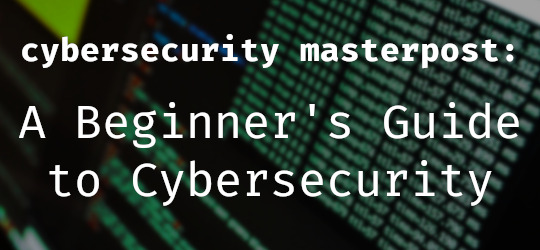
A Beginner's Guide to Learning Cybersecurity
I created this post for the Studyblr Masterpost Jam, check out the tag for more cool masterposts from folks in the studyblr community!
(Side note: this post is aimed towards the technical side of security, rather than the governance/management side, because the tech stuff is what I'm familiar with.)
Where do I start?
Cybersecurity is a specialization of general tech & therefore builds on some concepts that you'll need to know before you can dive deep into security. It's good to have a background in and understand:
how computers & operating systems work
how to use Linux
computer networking & basic protocols
If you're serious about learning cybersecurity, it can be helpful to look at certifications. Even if you don't want to get certified or take the exam (they can get expensive), they provide you with a list of topics that you can use to guide your self-study. And if you want to find a job, a certification is practically required for getting your foot in the door.
I personally recommend the CompTIA series of certifications, because they're well-recognized and I think they expose you to a good breadth and depth of material to get you started. Start with the A+ certification if you have zero tech background. Start with the Network+ certification if you've never taken a networking course. Once you get your basic computer and networking knowledge down, then you can jump into security. The Security+ is a good starting point.
Do I need to know how to code?
No, but it would be really really helpful. You don't have to be a skilled software engineer, but understanding the basics and being able to write small scripts will give you a solid foundation.
From Daniel Miessler's post How to Build a Cybersecurity Career:
You can get a job without being a programmer. You can even get a good job. And you can even get promoted to management. But you won’t ever hit the elite levels of infosec if you cannot build things. Websites. Tools. Proofs of concept. Etc. If you can’t code, you’ll always be dependent on those who can.
How do I gain skills?
Play Capture the Flag (CTF) games.
Stay up to date with security news via an RSS reader, podcasts, or whatever works for you. Research terms that you're unfamiliar with.
Watch conference talks that get uploaded to YouTube.
Spin up a VM to practice working with tools and experiment on your own computer.
There are lots of brilliant, generous people in cybersecurity who share their knowledge and advice for free. Find their blogs, podcasts, and YouTube channels. Look for local meetups in your area.
I'm still relatively new to the field, but I have a general knowledge of lots of different things, so feel free to send me an ask and I can probably help point you to some resources. We're all in this together!
Previous Cybersecurity Masterposts
An Introduction to Cybersecurity
Cybersecurity Book Masterpost
Free Cybersecurity Learning Resources Masterpost
Masterpost of Study Tips for Cybersecurity
Cybersecurity Tools Masterpost
Thank you so much to everyone who participated in the #StudyblrMasterpostJam this week! It was wonderful to see what other studyblr folks are passionate about. The jam technically ends today but there are no official rules, so if you've been thinking about writing a masterpost, this is your sign!
31 notes
·
View notes
Text
I ramble about the scientists and engineers on qsmp (mike, pac, tubbo, ramon and aypierre) and about what i think they specialize in:
Pac to me is a bio chemist/ pharmacist. He knows how to make antidotes as he did in the happy pills arc. He is the one in the tazercraft duo who learned medicine and chem. This man however does not know the meaning of "ethical practices". he picked up some physics and engineering knowledge from being with mike
Mike feels like a phycisist with some knowledge in other fields. It lfeels like he knows theory very well and has the problem solving skills for it. He knows some engineering stuff, some chem from pac and some computer science stuff. This is what helps him be a sort of jack of all trades and build things like the game arenas with pac.
Tubbo and ramon are very similar to me in that they are both just mechanical engineers who know some other stuff. They are create mod experts making them especially good at mechanical engineering but htey also know some electrical stuff and maybe some computer science. They are both well versed in physics though not professionals as they can do shit like time machines or build the radio reciever. Tubbo in particular is also a logistics nerd which is what pushes him to make large interconnected systems and factories.
Aypierre feels like a robotics and software expert. He might also be a create mod user but the way he does it and his factories give a much more modern fancy robot vibe. He certainly approaches the mod in a more 1 project at a time way which is closer to working on computer science. He also always makes displays that show what the factory is producing. Other evidence for this is the ayrobot shit.
Im convinved these 5 have had intense joke arguments over whihc science or field is the best. Theyve done it several times. By now pac has given up on fighting since hes the only biologist.
i need more scinecy art and shit frm them. Especially for pac. I need fitpac moments where pac is just rambling about some complicated chem stuff and fit is like :)
#qsmp#qsmp tubbo#qsmp pac#qsmp mike#qsmp aypierre#qsmp ramon#i love me the sciences#I love that morning times have so many scientists/ engineers#Im very into science and arguing wiht other science nerds about pointless shit like whats the best science is so much fun#As a physics nerd i bully the chemists and those who do engineering
110 notes
·
View notes
Text


Puzzling observation by JWST: Galaxies in the deep universe rotate in the same direction
In just over three years since its launch, NASA's James Webb Space Telescope (JWST) has generated significant and unprecedented insights into the far reaches of space, and a new study by a Kansas State University researcher provides one of the simplest and most puzzling observations of the deep universe yet.
In images of the deep universe taken by the James Webb Space Telescope Advanced Deep Extragalactic Survey, the vast majority of the galaxies rotate in the same direction, according to research by Lior Shamir, associate professor of computer science at the Carl R. Ice College of Engineering. About two thirds of the galaxies rotate clockwise, while just about a third of the galaxies rotate counterclockwise.
The study—published in Monthly Notices of the Royal Astronomical Society—was done with 263 galaxies in the JADES field that were clear enough to identify their direction of rotation.
"The analysis of the galaxies was done by quantitative analysis of their shapes, but the difference is so obvious that any person looking at the image can see it," Shamir said. "There is no need for special skills or knowledge to see that the numbers are different. With the power of the James Webb Space Telescope, anyone can see it."
In a random universe, the number of galaxies that rotate in one direction should be roughly the same as the number of galaxies that rotate in the other direction. The fact that JWST shows that most galaxies rotate in the same direction is therefore unexpected.
"It is still not clear what causes this to happen, but there are two primary possible explanations," Shamir said.
"One explanation is that the universe was born rotating. That explanation agrees with theories such as black hole cosmology, which postulates that the entire universe is the interior of a black hole. But if the universe was indeed born rotating it means that the existing theories about the cosmos are incomplete."
The Earth also rotates around the center of the Milky Way galaxy, and because of the Doppler shift effect, researchers expect that light coming from galaxies rotating the opposite of the Earth's rotation is generally brighter because of the effect.
That could be another explanation for why such galaxies are overrepresented in the telescope observations, Shamir said. Astronomers may need to reconsider the effect of the Milky Way's rotational velocity—which had traditionally been considered to be too slow and negligible in comparison to other galaxies—on their measurements.
"If that is indeed the case, we will need to re-calibrate our distance measurements for the deep universe," he said.
"The re-calibration of distance measurements can also explain several other unsolved questions in cosmology, such as the differences in the expansion rates of the universe and the large galaxies that, according to the existing distance measurements, are expected to be older than the universe itself."
TOP IMAGE: Spiral galaxies imaged by JWST that rotate in the same direction relative to the Milky Way (red) and in the opposite direction relative to the Milky Way (blue). The number of galaxies rotating in the opposite direction relative to the Milky Way as observed from Earth is far higher. Credit: Monthly Notices of the Royal Astronomical Society (2025). DOI: 10.1093/mnras/staf292
LOWER IMAGE: Spiral galaxies imaged by JWST that rotate in the same direction relative to the Milky Way (red) and in the opposite direction relative to the Milky Way (blue). The number of galaxies rotating in the opposite direction relative to the Milky Way as observed from Earth is far higher. Credit: Kansas State University
15 notes
·
View notes
Text

Episode 53: Permission
Keaton Household
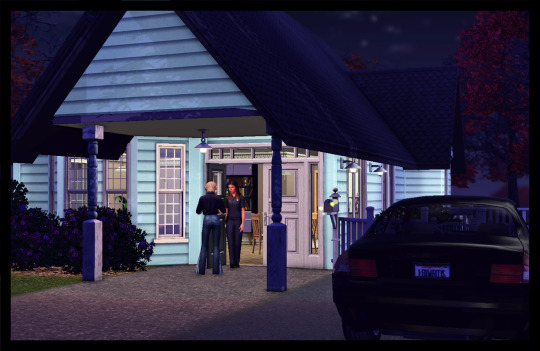
Two days later. It's 7:45 p.m. and it's actually quite an unusual time to be visiting someone. But Blair felt the urgent need to speak to Justine. "Blair? What are you doing here at this time of night?“/ ”I'm sorry, I hope I'm not disturbing you, I really need to talk to you, wait, I'll just finish the message…".
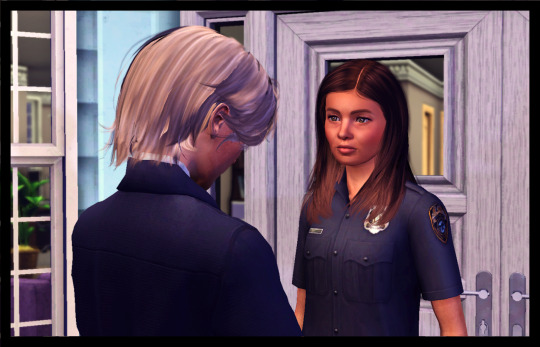
After Blair had finished her message on the smartphone, she put it back in her pocket. "What's this about? We're about to eat dinner“/ ”I'll try to keep it short. When I was dealing with a pile of unsolved cases the other day, one in particular caught my eye. it's about the murders of three men".
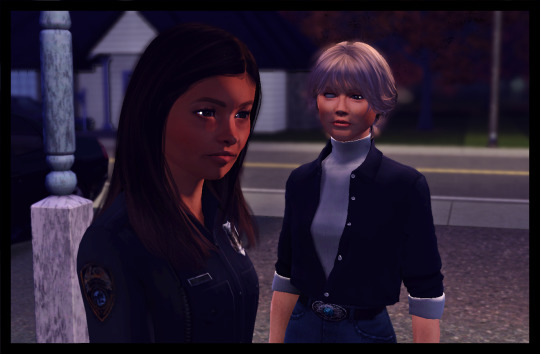
Justine huffed slightly annoyed and turned towards the door. "Unsolved, huh? I've seen the pile. Apparently the colleagues who were here before us didn't get anything right. Come in first, but don't speak too obviously, Kennie's still awake."

Justine hadn't been home long herself and therefore hadn't had time to change. Blair greeted Marty and Kendrick, who were already at dinner. “So, what about the case?”/ "Like I said, it's unsolved and some things are still pretty unclear. I'd like to really get stuck into it, if you don't mind?".
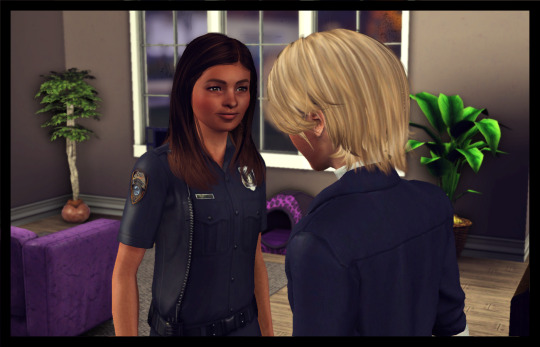
Justine looked at her and smiled a little.“Do you remember what you said to me a while ago?”/ "Yes, that I didn't really want to have much to do with police work anymore. But I've changed my mind again anyway. And I'd really like to take care of this case." / “It…Doesn't really seem like an everyday thing, does it?” Blair looked at her and shook his head with a serious expression.
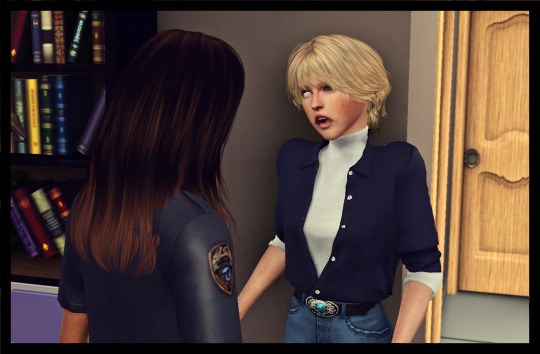
Justine looked at her son for a moment. "You know what? Let's talk about it tomorrow at the station, all right? I haven't dealt with the old stuff here yet“/ ”yeah, all right. Sorry, I know I could have said something this morning, but you were busy and then you had to go back on patrol".
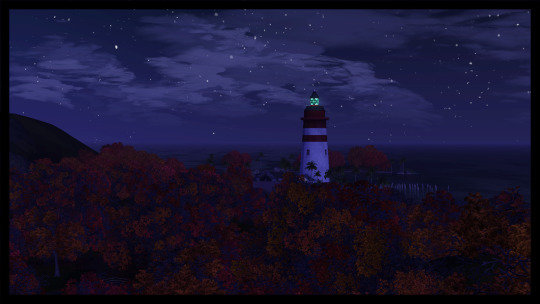
"I have a lot of field work at the moment, yes, but you can still come to me or call me at any time. I know you're not that familiar with the new boss yet“/ ”He's hardly ever in the building, so i don't have a chance to talk to him. You're an inspector and my next superior". Justine nodded in agreement. "That's okay. As I said, we'll talk tomorrow".

A little later. “What's been going on?”/ "Well, apparently Blair has decided to get back into it full time. I knew there were still open cases, but there's probably one that stands out. I'll listen to it and watch it tomorrow. Now I just want to sleep“/ ”well then, jump in". It was indeed surprising for Justine that Blair would take a little more interest in a case for once. But now she was also curious as to what this case was about.
------------------------------------------------------------
The next morning…
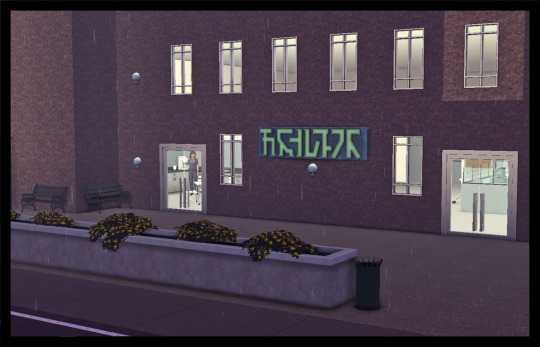
8:14 am. Police duty starts early and Justine is fit for the day despite a relatively short night. She waits for Blair to arrive soon and talk to her about the special case. It was not unusual for colleagues to be late from time to time.
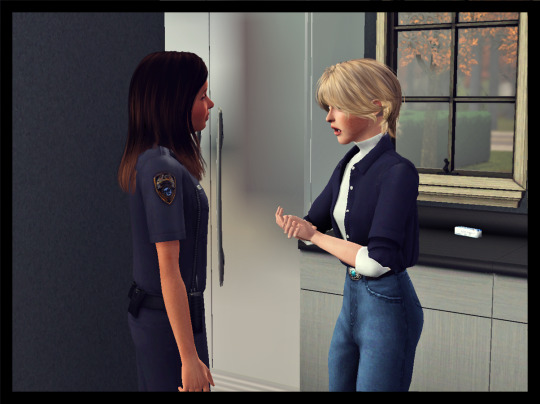
Less than five minutes later, Blair came rushing in. “I'm sorry I'm late, I had problems with my car”/ “Was there something wrong with the engine?”/ "Also, oh man, this thing isn't the latest model, but there wasn't anything else in the low price range. OK, so you want me to show you what the case is first?". Justine quickly noticed Blair's euphoria and commitment to the work. “That's what I'm here for now, mhm”.
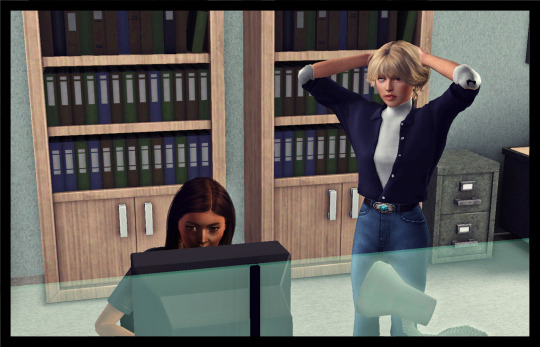
Blair searched for everything she had already gathered on the case. Much of it had been scanned into the computer so that information could be sent to another colleague at any time. “So the perpetrator is still out there somewhere?”/ “I guess so”/ “why gay men of all people?”.
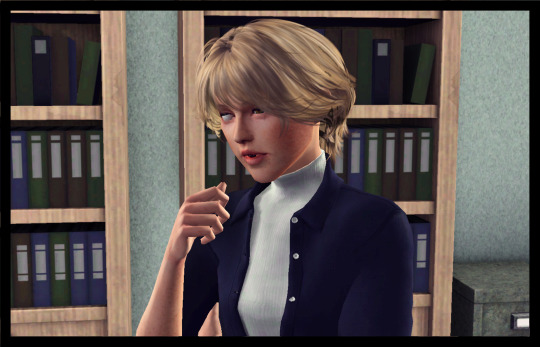
"I assume the perpetrator had a strict aversion to men who were interested in their own kind. As you can see, the crime was always the same, it's just too bad that there are no DNA traces“/ ”Yes, it's difficult to track down the perpetrator. Unless…“/ ”You catch him in the act…" Blair said quickly. Justine nodded in response.

Justine slowly got up from her chair. “I haven't really noticed anyone in the city who goes after other people”/ “maybe it's someone completely inconspicuous who's just waiting to strike again”/ "hm. there hasn't been a murder like this for a year and a half, at least not here. He doesn't seem to be after other people“/ ”no, just men like that".
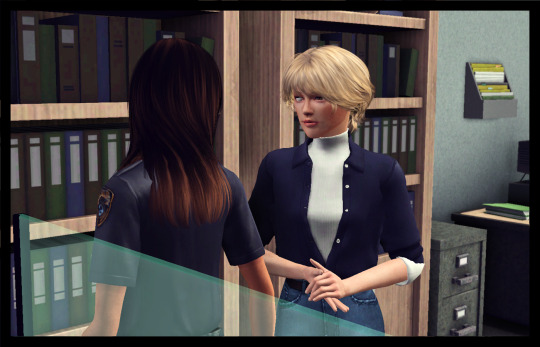
“Is there anyone here at the moment who is… you know”/ "gay? I don't know, I can't just go after everyone and ask, hey, are you gay?“/ ”hnhn, that's right, of course. When was your last shooting practice?“/ ”It's been ages, that was before the big bang“/ ”I'd advise you to take a few lessons again, just to be on the safe side“/ ”Mhm. So… Can I take care of the case?"/ Justin nodded at her and Blair clenched her fists happily. "Okay, thanks. I'll take care of the old witness interviews first.". Blair had a lot of motivation, there was nothing else that was important to her at the moment. Apart from her family, of course.
----------------------------------------------------------
@greenplumbboblover , @solorisims , @honeywinesims ⭐
#new horizons#ts3 story#the sims 3 story#ts3 screenshots#ts3 gameplay#the sims 3 gameplay#blair sword
7 notes
·
View notes
Text
Cutting it close as always, this is just who I am as a person haha. Happy birthday to my darling @fairytalegonewronga03!!! I hope you were celebrated like the queen that you are today! Thanks for being an incredible friend, enjoy your special gift!

you’re that special something that’s got me spinning out of control
Eddie steps out of the Uber with his duffel bag and takes a deep breath. This isn’t exactly how he’d wanted to spend his weekend, but he’d quite literally gotten the short end of the stick. No one had been able to agree on who should come to this event to represent the 118 and it had come down to drawing straws. He’d drawn the shortest one and now Christopher’s spending the weekend with his cousins while Eddie is downtown for one of the biggest events of the year. It’s a national firefighting conference where he gets to spend his time learning the latest firefighting techniques, witness demonstrations with cutting edge equipment that he’ll most likely never see in the field, and be able to trade stories with comrades from all over the country. At least he won’t be bored.
Sighing, he hefts his duffel higher up onto his shoulder and heads through the revolving door. There’s a line of men and women off to the right by the registration tables if the signs are pointing him in the right direction. He steps into the closest one, pulling out his phone and sending a text to the 118 group chat to let everyone know he’s made it. Not that he had very far to go. They had even joked about dropping him off while refueling the engine to save some money. But no, the LAFD is paying for this trip and Eddie intends to make every last dime count.
It’s not too long before he’s standing in front of a woman with pinned back blond curls, cherry red lipstick, and square glasses on her face. “Name and station?” She asks, picking up her clipboard as she glances at him. “And ID.”
“Eddie Diaz, checking in for the 118 stationed here in L.A.” He opens his wallet and shows his word ID and driver’s license. There’s a derisive snort from behind him and he tenses up, waiting for whoever it is to say something. But whoever it is must have lost their nerve. The woman handing out badges nods and checks him off her list, handing him a name tag and a plastic badge.
“Make sure you hold onto this for the whole weekend.” She tells him before waving him toward the front desk so she can help the next person. Eddie doesn’t stick around, hopeful it’s not too early for his room to be ready as he joins a small line. This one moves quickly and in no time, he’s at the front of it. He relays his information again, holding out his driver’s license, and the young woman taps at a few keys on her computer before handing over a card.
“Here you go! Thanks for being patient, Mr. Diaz. You’re in room 819 on the 8th floor. The elevators are down this hall to your left.”
“Thanks.” Eddie says, collecting his key and stepping off to the side. Putting his wallet away, he heads for the elevator and joins a small group waiting. A stocky man with brown hair, close to Eddie’s height, manages to squeeze in at the last moment before the doors close. Most everyone seems too exhausted or disinterested to carry on any kind of conversation, which is fine by Eddie. Today’s a check-in day, the real fun won’t begin until tomorrow, so he can spend a couple of hours in his room surfing channels on the TV and resting since he’s fresh off of a 48 hour shift.
The doors open and he steps out of the elevator, surprised when the stocky man that had entered last follows with a small bag slung over his shoulder. He glances at the sign on the wall and follows the doors down the hall until he reaches 819. “Well,” the man drawls as he slows to a stop beside Eddie, “guess we’re roommates.”
8 notes
·
View notes